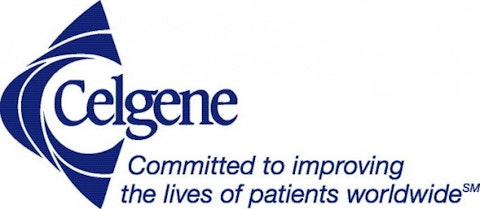Celgene Corporation (NASDAQ:CELG)’s Abraxane is primarily used to treat breast and lung cancer. It is a very lucrative drug for the company with almost half a billion dollars in sales last year alone. It is prospectively going to become even more lucrative as studies are ongoing to see if the drug is also effective against pancreatic tumors. The FDA has also granted Abraxane priority review instead of the normal review period that takes four months to study its potential in advanced pancreatic cancer therapy.
This drug has already shown upward sales trend in treating metastatic breast cancer, and is expected to grow further with recent approval for non-small-cell lung cancer therapy. For the last three years, Abraxane has been reporting significant growth in sales volume both in the U.S. and internationally. In addition, if it becomes an approved product candidate for pancreatic cancer after the priority review, sales will grow even more this fiscal.
Figure1:

Pancreatic cancer market
Pancreatic cancer is as deadly as any other cancer. Readers will recall that Steve Jobs died of this disease — from a rare form of it, a neuroendocrine tumor. Worryingly, the death rate has been slowly increasing among both men and women compared to other cancers. According to an American Cancer Society Surveillance Research, in 2013, U.S. pancreatic cancer incidence rate increased by 0.9% per year among men and remained stable for women during the last 10 years (2000-2009). The mortality trends also rose during the same period, with an increase of 0.5% per year for white men and women, and by 1% per year for Asian American and Pacific Islander men.
Figure2:

Most pancreatic cancer patients die within the first year of diagnosis due to lack of early diagnosis and primary prevention methods. Five year survival rate has jumped to only 6%, and surgery is the only perfectly curative option available. Till date, the primary cause of pancreatic cancer is not yet identified though factors like obesity, cigarette smoking, and other forms of tobacco consumption are likely to blame. Tumor growth generally happens on both exocrine (produce digestive enzymes) and endocrine (produce insulin) glands; however, exocrine tumors alone represent around 95% of cases.
Competitor landscape
With increasing unmet needs, most companies are focusing on developing novel drugs to treat pancreatic cancer along with chemotherapy. Currently, a few FDA approved drugs such as Sutent (Pfizer), Afinitor (Novartis), Tarceva (Roche), and Gemzar (Eli Lilly) are already available for the treatment of advanced pancreatic cancer.
Table1:
Products/ Product candidates | Company | Indications | Status |
| Sutent | Pfizer | Advanced pancreatic neuroendocrine (pNET) | Marketed |
| Afinitor | Novartis | pNET | Marketed |
| Tarceva+Gemzar | Roche & Eli Lilly | Metastatic pancreatic cancer | Marketed |
| Folfirinox | Combined therapy | Advanced pancreatic cancer | Marketed |
| CO-101 | Clovis Oncology | Pancreatic cancer | Failed |
| TH-302 | Threshold Pharmaceuticals | Advanced pancreatic cancer | Phase III |
| TH-302+Gemzar | Threshold & Eli Lilly | Advanced pancreatic cancer | Phase III |
| Abraxane | Celgene | Non-small cell lung cancer Metastatic breast cancer | Marketed |
| Abraxane | Celgene | Advanced pancreatic cancer | Phase III |
| Abraxane+Gemzar | Celgene & Eli Lilly | Advanced pancreatic cancer | Phase III |
Source: Competitive landscape




